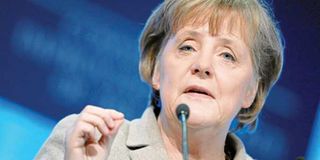For euro reforms, growth is the enemy

What you need to know:
- The more the euro zone economy thrives, the less pressure there will be on European politicians to take steps to prevent future crises.
- The resurgence is welcome because it bolsters public support for the single currency.
Europe’s currency union - not so long ago on its sickbed - has started the year in rude health.
The winning streak looks set to continue since economic confidence in the euro area is at its highest for almost two decades, but it will have an unwelcome side-effect.
The more the euro zone economy thrives, the less pressure there will be on European politicians to take steps to prevent future crises.
The resurgence is welcome because it bolsters public support for the single currency.
However, the boom fostered by the European Central Bank’s (ECB) easy money policies will tempt politicians to shun the hard decisions involved in deeper integration.
Further reforms remain vital because the monetary union of 19 states lacks the same fiscal and political foundations that underpin a national currency.
Instead there is a divide between northern economies that can cope with the rigor of a common currency and those in southern Europe that have found it hard going.
The ECB has rescued the weaklings with its ultra-loose monetary policy, but that offers no more than temporary respite.
A rare opportunity for pressing ahead with reforms appeared to open up last year when Emmanuel Macron prevailed over populist euro-skeptic forces in France.
The new French president made clear he wanted to rev up the Franco-German engine for closer European integration, which had lapsed when the euro debt crisis was gravest between 2010 and 2012 and Germany took the lead owing to its stronger economy and sounder public finances.
Specifically, Macron advocates a euro zone budget and finance minister, in effect the rudiments of a fiscal union to support the monetary union.
Just as the reform locomotive was getting up steam in France, it ran into the political sidings in Germany.
First, Angela Merkel’s governing CDU/CSU party bloc did much worse than expected in the German election in September, getting its lowest share of the vote since 1949.
Then, the chancellor’s first attempt at creating a coalition government, with two ideologically opposed small parties, the pro-business FDP and the environmentalist Greens, collapsed in late November when the FDP abruptly broke off negotiations.
Following the breakthrough in exploratory talks, a renewed coalition with the center-left SPD, with which Merkel has ruled Germany for eight of the past 12 years, now looks possible.
But obstacles remain because any eventual formal agreement will have to be put to the SPD’s members, many of whom oppose a further partnership with Merkel since they believe it has undermined the party’s popular support.
If they do not endorse a deal the chancellor faces an unpalatable choice between ruling as a minority government or another election, whose result might be as inconclusive as last year’s vote.
Even if the strongly pro-European SPD does swallow its reservations and join a coalition government led by Merkel, the euro zone reform train Macron aimed to set rolling looks less likely to make progress than hoped.
The German chancellor undoubtedly wants to engage with the French president, who saved Europe from a potentially shattering populist revolt following the Brexit vote. But her response is likely to be a more of a gesture than a genuine change of heart.
Merkel after all devoted much time and effort during the crisis to minimizing calls on German taxpayers to support the monetary union, recognizing that this was essential if Germans were to continue backing the venture.
She strongly opposed the idea of issuing eurobonds whose liabilities would be jointly shared across the monetary union, making this rejection one of her main campaign points in the 2013 federal election.




